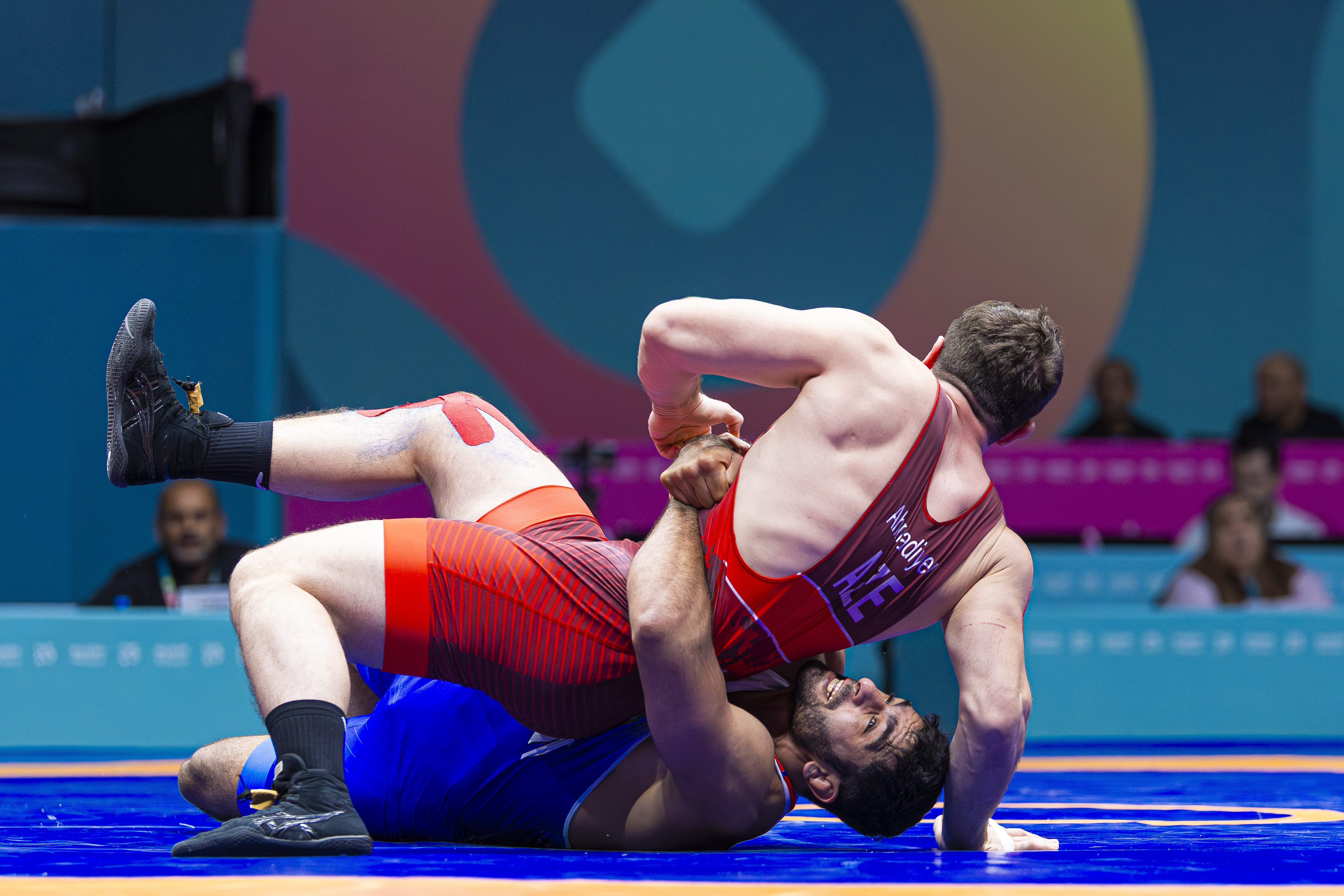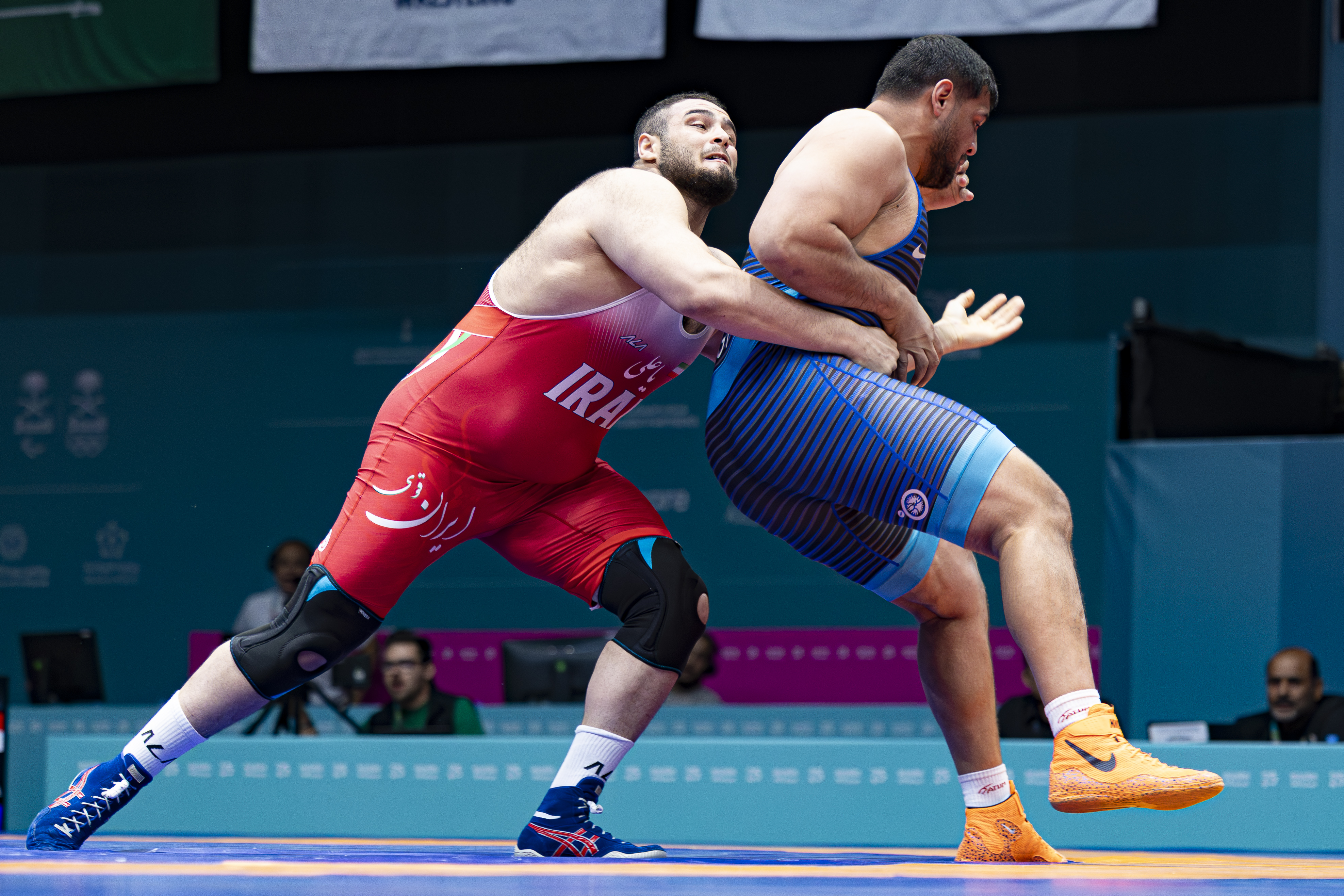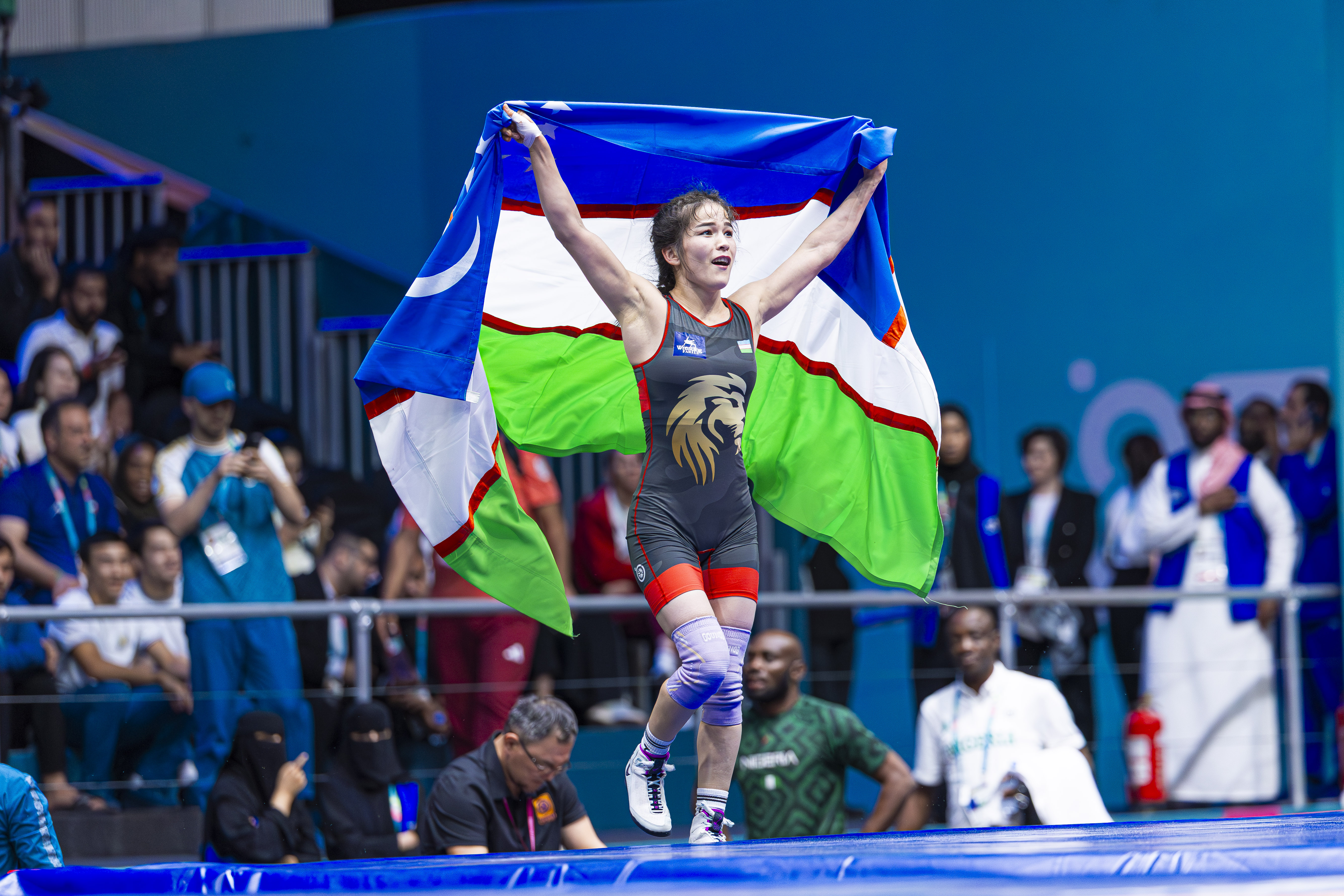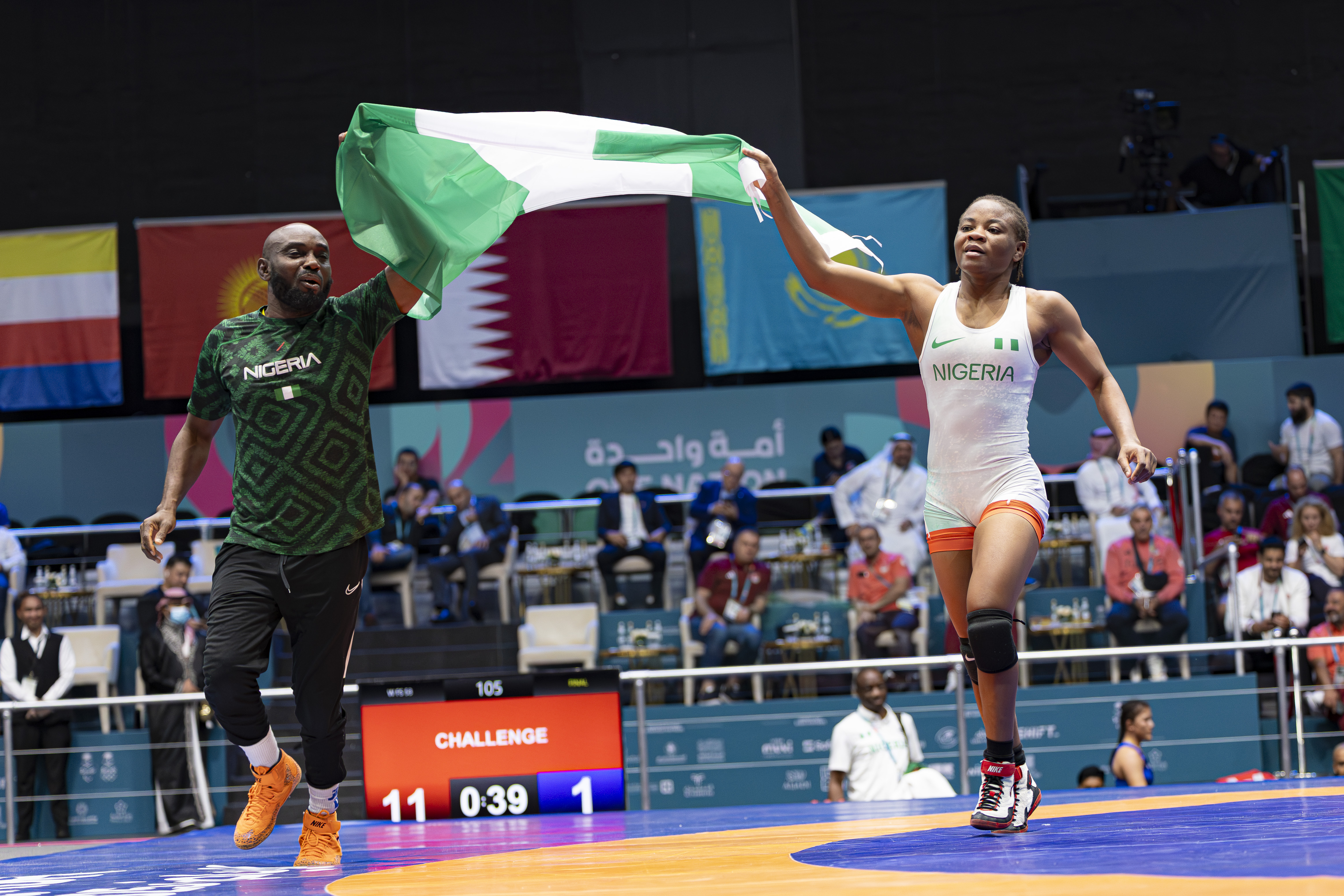RIYADH, Saudi Arabia (November 19) -- If there was battle for the most dominant wrestler among the Iranian wrestlers, it would be a close one. Saeid ESMAEILI (IRI) won Asian and World Championships and a Ranking Series gold before winning the gold medal at the Islamic Solidarity Games 2025 on Tuesday.
Gholamreza FAROKHI (IRI) won gold at Zagreb Ranking Series, gold at senior and U23 World Championships and like Esmaeili, gold at ISG 2025.
On Wednesday, Olympic and world champion Mohammadhadi SARAVI (IRI) also joined that list as he won gold medal at 97kg at ISG in Riyadh, Saudi Arabia on Wednesday.
Saravi has been unstoppable this year, just like Esmaeili and Farokhi, winning Ranking Series gold, and gold medals at the Asian and World Championships. In Riyadh, he showed why he has been so good this year.
 Mohammadhadi SARAVI (IRI) turns Murad AHMADIYEV (AZE) from par terre in the 97kg final. (Photo: United World Wrestling / Kadir Caliskan)
Mohammadhadi SARAVI (IRI) turns Murad AHMADIYEV (AZE) from par terre in the 97kg final. (Photo: United World Wrestling / Kadir Caliskan)
In one of the marquee matches of the night, Saravi held his own to beat world bronze medalist Murad AHMADIYEV (AZE) in the 97kg final.Saravi and Ahmadiyev were clearly a notch up the field in Riyadh in their weight class and reached the final with ease. But when the two clashed, Saravi clearly had a gameplan to not get caught in any upset.
Ahmadiyev had pinned Artur ALEKSANYAN (ARM) at the World Championships after a block when the Armenian was trying a gut wrench. So when Saravi got the chance in par terre in the final, he only tried a gut wrench once and then let the referee call neutral.
Saravi went into the break leading 3-0. He was called passive in the second period and put in par terre but he defend the position and gave only one point. As Ahmadiyev struggled with his conditioning, Saravi managed to score two stepouts and win the gold medal with a 5-1 score.
The Iranian has now not lost since the 2023 World Championships in Belgrade, extending his winning run to over two years.
 Fardin HEDAYATI (IRI) prepares to throw Mohamed ABDELLATIF (EGY) during the 130kg final. (Photo: United World Wrestling / Kadir Caliskan)
Fardin HEDAYATI (IRI) prepares to throw Mohamed ABDELLATIF (EGY) during the 130kg final. (Photo: United World Wrestling / Kadir Caliskan)
At 130kg, rising star Fardin HEDAYATI (IRI) too has a great winning run. Since his U20 World Championships final loss in 2022, Hedayati has not lost an international bout and capped his 2025 season with gold medal at the Islamic Solidarity Games 2025.
Placed in Group A of the Nelson bracket, Hedayati topped his group before winning the semifinal with ease. In the final, he faced Abdellatif MOHAMED (EGY), who the Iranian defeated in the first group bout 3-0.
If that was a warm-up win, Hedayati showed what he is capable of, winning the final in just 35 second via fall against Abdellatif. He began with a four-point throw which was challenged by Egypt only to lose the challenge.
Leading 5-0, Hedayati hit an arm-throw for two points before dragging Abdellatif for another takedown with his back on the mat. Hedayati held the Egyptian in that position and secured the fall to end the match and capture the gold medal.
 Aktenge KEUNIMJAEVA (UZB) celebrates after winning the 50kg final. (Photo: United World Wrestling / Kadir Caliskan)
Aktenge KEUNIMJAEVA (UZB) celebrates after winning the 50kg final. (Photo: United World Wrestling / Kadir Caliskan)
Three women's wrestling weight classes were also in action on Wednesday in Riyadh and three different countries won gold medals.
At 50kg, Aktenge KEUNIMJAEVA (UZB) needed a hip-toss in the last 30 seconds to score four points against Miesinnei GENEISI (NGR) and take a 5-1 lead. The Uzbekistan wrestler led 1-0 at the break after Geneisi's passivity. But the Nigerian took an 1-1 criteria lead in the last minute when Keunimjaeva was called passive.
Desperate to find an opening, Keunimjaeva locked both of Geneisis' arms and tossed her for four points, taking a 5-1 lead and defending it to win the gold medal.
 Christianah OGUNSANYA (NGR) won the gold medal at 53kg. (Photo: United World Wrestling / Kadir Caliskan)
Christianah OGUNSANYA (NGR) won the gold medal at 53kg. (Photo: United World Wrestling / Kadir Caliskan)
The winning country was reversed in the 53kg final as Christianah OGUNSANYA (NGR) defeated Shokhida AKHMEDOVA (UZB), 11-1, to win the gold medal.
Akhmedova failed to match the power of Ogunsanya who kept scoring with counter takedowns. She scored a takedown and a turn using lace to win the bout 11-1.
The final gold medal of the night went to former U23 world champion Zhala ALIYEVA (AZE) who defeated European silver medalist Elvira SULEYMAN (TUR) in the 57kg final.
Aliyeva, who had defeated Suleyman in Round 1 bout as well, faced the Turkish wrestler again and kept it simple. She scored three takedown before giving up one in the final few seconds. She managed to hold on to her 6-2 lead for the win.

RESULTS
Greco-Roman
97kg
GOLD: Mohammadhadi SARAVI (IRI) df. Murad AHMADIYEV (AZE), 5-1
BRONZE: Beytullah KAYISDAG (TUR) df. Mohamed GABR (EGY), 3-1
BRONZE: Rouabah FADI (ALG) df. Ibrahim FALLATAH (KSA), 8-0
130kg
GOLD: Fardin HEDAYATI (IRI) df. Abdellatif MOHAMED (EGY), via fall (9-0)
BRONZE: Fatih BOZKURT (TUR) df. Roman KIM (KGZ), 11-2
Women's Wrestling
50kg
GOLD: Aktenge KEUNIMJAEVA (UZB) df. Miesinnei GENEISI (NGR), 5-1
BRONZE: Elnura MAMMADOVA (AZE) df. Chebila CHEIMA (ALG), 7-0
53kg
GOLD: Christianah OGUNSANYA (NGR) df. Shokhida AKHMEDOVA (UZB), 11-1
BRONZE: Aruuke KADYRBEK KYZY (KGZ) df. Yusma DESWITA (INA), via fall (3-0
BRONZE: Zeinep BAYANOVA (KAZ) df. Vatansulton SHAKARSHOEVA (TJK), 14-3
57kg
GOLD: Zhala ALIYEVA (AZE) df. Elvira SULEYMAN (TUR), 6-2
BRONZE: Tekouk ACHOUAK DJAMILA (ALG) df. Sezim ZHUMANAZAROVA (KGZ), via fall (14-3)



 Mohammadhadi SARAVI (IRI) turns Murad AHMADIYEV (AZE) from par terre in the 97kg final. (Photo: United World Wrestling / Kadir Caliskan)
Mohammadhadi SARAVI (IRI) turns Murad AHMADIYEV (AZE) from par terre in the 97kg final. (Photo: United World Wrestling / Kadir Caliskan) Fardin HEDAYATI (IRI) prepares to throw Mohamed ABDELLATIF (EGY) during the 130kg final. (Photo: United World Wrestling / Kadir Caliskan)
Fardin HEDAYATI (IRI) prepares to throw Mohamed ABDELLATIF (EGY) during the 130kg final. (Photo: United World Wrestling / Kadir Caliskan) Aktenge KEUNIMJAEVA (UZB) celebrates after winning the 50kg final. (Photo: United World Wrestling / Kadir Caliskan)
Aktenge KEUNIMJAEVA (UZB) celebrates after winning the 50kg final. (Photo: United World Wrestling / Kadir Caliskan) Christianah OGUNSANYA (NGR) won the gold medal at 53kg. (Photo: United World Wrestling / Kadir Caliskan)
Christianah OGUNSANYA (NGR) won the gold medal at 53kg. (Photo: United World Wrestling / Kadir Caliskan)
Share your thoughts.
Comments